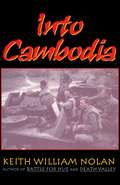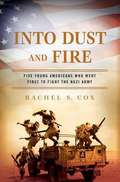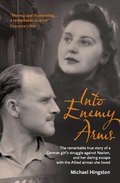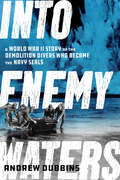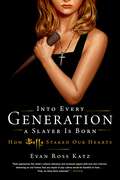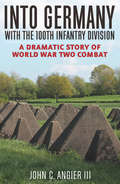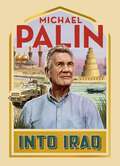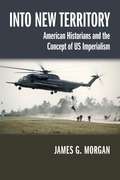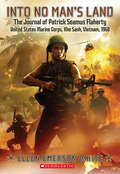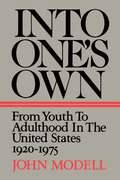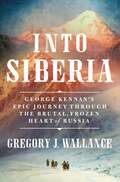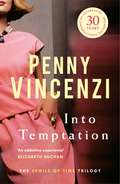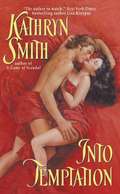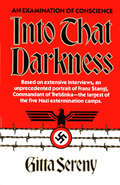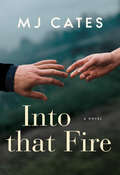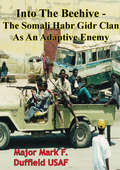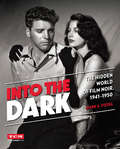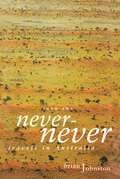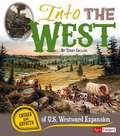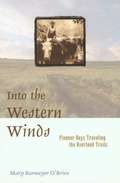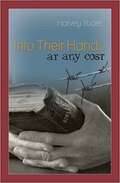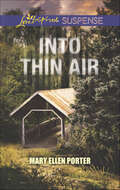- Table View
- List View
Into Cambodia: Spring Campaign, Summer Offensive, 1970
by Keith William Nolan"Most of us remember (the 1970 Cambodian campaign) best for the killings of four young people at Kent State. Nolan wants us to remember that it killed a lot of young Americans in Cambodia as well. " -- The Capital Tittles (Madison, WI)"This is combat narrative at its best. Nolan has mastered the soldier's slang and weaves it expertly into the account . . . . full of combat anecdotes detailing battlefield leadership successes and failures. " -- Military Review
Into Dust and Fire
by Rachel S. CoxThe untold story of five young American friends who left the ivory towers at Harvard and Dartmouth to take on Rommel's Panzers under the blazing sun of North Africa... In the spring of 1941, with Europe consumed by war and occupation, Britain stood alone against the Nazi menace. The United States remained wary of joining the costly and destructive conflict. But for five extraordinary young Americans, the global threat of fascism was too great to ignore. Six months before Pearl Harbor, these courageous idealists left their promising futures behind to join the beleaguered British Army. Fighting as foreigners, they were shipped off to join the Desert Rats, the 7th Armoured Division of the British Eighth Army, who were battling Field Marshal Rommel's panzer division. The Yanks would lead antitank and machine-gun platoons into combat at the Second Battle of El Alamein, the twelve-day epic of tank warfare that would ultimately turn the tide for the Allies. A fitting tribute to five men whose commitment to freedom transcended national boundaries, Into Dust and Fire is a gripping true tale of idealism, courage, camaraderie, sacrifice, and heroism. INCLUDES PHOTOS
Into Enemy Arms: The Remarkable True Story of a German Girl's Struggle against Nazism, and Her Daring Escape with the Allied Airman She Loved
by Michael HingstonThe suspenseful true story of a love that defied Nazi oppression, and a harrowing journey to freedom. In 1945, Ditha Bruncel was living with her parents in the small town of Lossen, in Upper Silesia. Close Jewish friends had vanished, swastikas hung from every building, and neighbors were disappearing in the middle of the night. At the same time more than fifteen hundred British and Commonwealth airmen were being marched out of Stalag Luft VII, a POW camp in the same region. Twenty-three of these prisoners managed to escape from the marching column—and by chance hobbled into Lossen. One among them, Warrant Officer Gordon Slowey, was the man Ditha was destined to meet and fall in love with. Into Enemy Arms tells the extraordinary story of Ditha and the escaped POWs she helped save. Together, they embarked on a dangerous and daring flight out of Germany. As they faced exhaustion, hunger, extreme cold, and the constant risk of discovery, Ditha and Gordon&’s love for one another intensified, and so did their determination to survive and escape.
Into Enemy Waters: A World War II Story of the Demolition Divers Who Became the Navy SEALS
by Andrew DubbinsA veteran US frogman recounts his experiences in World War II and the risky pre-invasion missions of the Underwater Demolition Teams.?Into Enemy Waters is the story of World War II’s most elite and daring unit of warriors, the direct precursors to the Navy SEALs, told through the eyes of its last living member, ninety-five-year-old George Morgan.Morgan was just a wiry, seventeen-year-old lifeguard from New Jersey when he joined the Navy’s new combat demolition unit, tasked to blow up enemy?coastal defenses ahead of landings by Allied forces. His first assignment: Omaha Beach on D-Day.When he returned stateside, Morgan learned that his service was only beginning. Outfitted with swim trunks, a dive mask, and fins, he was sent to Hawaii and then on to deployments in the Pacific as a member of the elite and pioneering Underwater Demolition Teams. GIs called them “half fish, half nuts.” Today, we call them frogmen—and Navy SEALS.Led by maverick Naval Reserve Officer Draper Kauffman, Morgan would spend the fierce final year of the war swimming up to enemy controlled beaches to gather intel and detonate underwater barriers. He’d have to master the sea, muster superhuman grit, and overcome the demons of Omaha Beach.Moving closer to Japan, the enemy’s island defenses were growing more elaborate and its soldiers more fanatical. From the black sand beaches of Iwo Jima to the shark infested reefs of Okinawa, to the cold seas of Tokyo Bay, teenaged George Morgan was there before most, fighting for his life. And for all of us.Perfect for fans of?Unbroken,?The Right Stuff, and?Band of Brothers.Praise for Into Enemy Waters“A compelling narrative full of World War II fireworks.” —Kirkus Reviews“A rousing history. . . . Drawing on extensive interviews with Morgan, Dubbins creates a vivid and fast-moving narrative of courage and sacrifice under the most extreme conditions. WWII buffs will be thrilled.” —Publishers Weekly“This well-researched book is both visceral and uplifting, telling of a time of great courage, integrity and camaraderie.” —Jill?Heinerth,?author of Into The Planet: My Life as a Cave Diver
Into Every Generation a Slayer Is Born: How Buffy Staked Our Hearts
by Evan Ross KatzExplore the history and cultural impact of a groundbreaking television show adored by old and new fans alike: Buffy the Vampire Slayer. Over the course of its seven-year run, Buffy the Vampire Slayer cultivated a loyal fandom and featured a strong, complex female lead, at a time when such a character was a rarity. Evan Ross Katz explores the show&’s cultural relevance through a book that is part oral history, part celebration, and part memoir of a personal fandom that has universal resonance still, decades later.Katz—with the help of the show&’s cast, creators, and crew—reveals that although Buffy contributed to important conversations about gender, sexuality, and feminism, it was not free of internal strife, controversy, and shortcomings. Men—both on screen and off—would taint the show&’s reputation as a feminist masterpiece, and changing networks, amongst other factors, would drastically alter the show&’s tone.Katz addresses these issues and more, including interviews with stars Sarah Michelle Gellar, Charisma Carpenter, Emma Caulfield, Amber Benson, James Marsters, Anthony Stewart Head, Seth Green, Marc Blucas, Nicholas Brendon, Danny Strong, Tom Lenk, Bianca Lawson, Julie Benz, Clare Kramer, K. Todd Freeman, Sharon Ferguson; and writers Douglas Petrie, Jane Espenson, and Drew Z. Greenberg; as well as conversations with Buffy fanatics and friends of the cast including Stacey Abrams, Cynthia Erivo, Lee Pace, Claire Saffitz, Tavi Gevinson, and Selma Blair.Into Every Generation a Slayer Is Born engages with the very notion of fandom, and the ways a show like Buffy can influence not only how we see the world but how we exist within it.
Into Germany with the 100th Infantry Division
by John C. AngierInto Germany with the 100th Infantry Division, first published in 1959 as MOS 1542: A Dramatic True Story of Combat in World War Two, is the fast-paced account of Sergeant (later Lieutenant) John Angier’s experiences as an infantryman in France and Germany. Included are vivid descriptions of the platoon’s battles and life at the front, as Angier’s platoon was at the frontline “for 175 consecutive days of hell,” losing 3 lieutenants and 38 men; only 5 of the original platoon remained at war’s end. For his service Angier received 13 decorations including the Combat Infantry Badge, Bronze Star with Cluster, Good Conduct Medal, Victory Medal, Occupation Germany Medal, Expert Infantryman Badge, American Defense Medal and National Security Medal. Angier passed away on March 29, 2005.
Into Harm's Way: Forced Return of Displaced People to Chechnya
by Human Rights WatchThe conflict in Chechnya continues to take a huge toll on civilians. The October 2002 hostage crisis in Moscow, which left 129 dead, has been followed by reports of abuses by Russian and rebel forces in Chechnya, and accelerated efforts by Russian authorities to force displaced people living in tent camps in Ingushetia back to Chechnya. Russian authorities have also significantly restricted access to the region, blocking access for international monitors, including those from the Organization for Security and Cooperation in Europe (OSCE).
Into Iraq
by Michael PalinIn March 2022, Michael Palin travelled the length of the River Tigris through Iraq to get a sense of what life is like in a region of the world that once formed the cradle of civilisation, but that in recent times has witnessed turmoil and appalling bloodshed. In the journal he kept during his trip he describes the war-ravaged city of Mosul and the children he encounters growing up amid its ruins. He contemplates the graffiti-strewn ruins of Saddam Hussein's former palaces, and he notes the constant presence of armed guards. But there are patches of light amid the dark: boisterous New Year celebrations in Akre, the friendliness of generals and colonels at 'Checkpoint Cheerful', and public poetry readings in Baghdad. People getting on with their lives.At the same time, Michael charts the course of one of the great rivers of the world, showing how the water that gave life to such ancient settlements as Babylon and Ur is now becoming a scarce and hotly contested resource. And he considers the role that Iraq's other great natural resource - oil - plays in both providing wealth and threatening political stability.Illustrated throughout with colour photographs taken on the trip, and permeated with his warmth and humour, this is a vivid and varied portrait of a complex country.
Into New Territory
by James G. MorganThe idea that the United States-a nation founded after a war of independence-operates as an imperialist power on the world stage has gained considerable traction since the turn of the twenty-first century. But just a few decades earlier, this position was considered radical and even "un-American. " How did this dramatic change come about? Tracing the emergence of the concept of US imperialism, James G. Morgan shows how radical and revisionist scholars in the 1950s and 1960s first challenged the paradigm of denying an American empire. As the Vietnam War created a critical flashpoint, bringing the idea of American imperialism into the US mainstream, radical students of the New Left turned toward Marxist critiques, admiring revolutionaries like Che Guevara. Simultaneously, a small school of revisionist scholars, led by historian William Appleman Williams at the University of Wisconsin, put forward a progressive, nuanced critique of American empire grounded in psychology, economics, and broader historical context. It is this more sophisticated strand of thinking, Morgan argues, which demonstrated that empire can be an effective analytical framework for studying US foreign policy, thus convincing American scholars to engage with the subject seriously for the first time. "
Into No Man’s Land, the Journal of Patrick Seamus Flaherty, United States Marine Corps, Khe Sanh, Vietnam: The Journal Of Patrick Seamus Flaherty, United States Marine Corps, Khe Sanh, Vietnam 1968
by Ellen Emerson WhiteThe Vietnam War journal of Patrick Seamus Flaherty is now available in paperback, with an exciting repackaging! Determined to do his duty for his country, Patrick Seamus Flaherty joins the Marines right after graduation to fight in the Vietnam War. But Southeast Asia is a far cry from Patrick's hometown of Boston, and as soon as he arrives, he realizes that he's made a terrible mistake.Confronted with oppressive heat, dense jungles, and an enemy that is everywhere, Patrick is overwhelmed by life on the battlefield. With the help of his comrades, Patrick slowly starts to find a way to deal with the harsh realities he faces. But under constant assault by the North Vietnamese, Patrick isn't sure he'll ever make it home again, and as the months drag on, he and his unit question whether they're actually making a difference. Writing in the journal his father gave him before shipping out, Patrick brings Khe Sanh to vivid life through the smells, tastes, sounds, horrors, loneliness, and the friendships that are so much of the chaos called war.
Into One's Own: From Youth to Adulthood in the United States, 1920-1975
by John ModellTracing the life course of American teenagers in the mid-twentieth century, Into One's Own presents a compelling historical portrait of growing up.
Into Siberia: George Kennan's Epic Journey Through the Brutal, Frozen Heart of Russia
by Gregory J. Wallance"In Wallance’s bracing narrative, Kennan emerges as a cheerful, deeply decent companion, an uncompromising observer whose greatest strength was his ability to change his mind. He’s a welcome change from the callous imperialists who people most Victorian travelogues, and his humanity allows Into Siberia to delve into horror without succumbing to despair." — The New York Times Book ReviewIn a book that ranks with the greatest adventure stories, Gregory Wallance’s Into Siberia is a thrilling work of history about one man’s harrowing journey and the light it shone on some of history’s most heinous human rights abuses.In the late nineteenth century, close diplomatic relations existed between the United States and Russia. All that changed when George Kennan went to Siberia in 1885 to investigate the exile system and his eyes were opened to the brutality Russia was wielding to suppress dissent. Over ten months Kennan traveled eight thousand miles, mostly in horse-drawn carriages, sleighs or on horseback. He endured suffocating sandstorms in the summer and blizzards in the winter. His interviews with convicts and political exiles revealed how Russia ran on the fuel of inflicted pain and fear. Prisoners in the mines were chained day and night to their wheelbarrows as punishment. Babies in exile parties froze to death in their mothers’ arms. Kennan came to call the exiles’ experience in Siberia a “perfect hell of misery.” After returning to the United States, Kennan set out to generate public outrage over the plight of the exiles, writing the renowned Siberia and the Exile System. He then went on a nine-year lecture tour to describe the suffering of the Siberian exiles, intensifying the newly emerging diplomatic conflicts between the two countries which last to this day.
Into Temptation
by Penny VincenziPower, politics and closely guarded secrets abound in the epic INTO TEMPTATION, the third and final novel of Sunday Times bestselling author Penny Vincenzi's Spoils of Time trilogy.'Like an illicit lover, I have been sloping off all week to snatch another hour's pleasure with ... Penny Vincenzi's terrific new novel' Jilly CooperThe Lytton family past is full of secrets, and only Lady Celia knows them all. There's her daughter Adele's difficult, dark past; the dreadful cruelty of a truth her son Kit had to confront; even the shadows of Celia's own life, and that of Barty Miller, the child she rescued from the slums in babyhood who now owns more than half of the Lytton publishing house. Some secrets are more dangerous than others, some shared with Celia's family, some entirely her own. And all absolutely safe in her keeping. Until something threatens to reveal them all...
Into Temptation
by Penny VincenziPower, politics and closely guarded secrets abound in the epic INTO TEMPTATION, the third and final novel of Sunday Times bestselling author Penny Vincenzi's Spoils of Time trilogy. 'Like an illicit lover, I have been sloping off all week to snatch another hour's pleasure with ... Penny Vincenzi's terrific new novel' Jilly CooperThe Lytton family past is full of secrets, and only Lady Celia knows them all. There's her daughter Adele's difficult, dark past; the dreadful cruelty of a truth her son Kit had to confront; even the shadows of Celia's own life, and that of Barty Miller, the child she rescued from the slums in babyhood who now owns more than half of the Lytton publishing house. Some secrets are more dangerous than others, some shared with Celia's family, some entirely her own. And all absolutely safe in her keeping. Until something threatens to reveal them all...
Into Temptation (Friends Trilogy #3)
by Kathryn SmithLady Sophia Aberley swore she would never let Julian Rexley in her home or in her sight again. Though years have passed, she has not yet forgotten the humiliation of scandal-having been banished to the country for 'shameful' actions. But she cannot abandon a friend in need, even if that friend is Julian's sister, and now she is back in London . . .
Into That Darkness
by Gitta SerenyBased on 70 hours of interviews with Franz Stangl, commandant of Treblinka (the largest of the extermination camps), this book bares the soul of a man who continually found ways to rationalize his role in Hitler's final soulution.From the Trade Paperback edition.
Into That Fire
by M. J. CatesFans of Ian McEwan and Paula McLain will fall for this absorbing novel about love and madness, the toll of the First World War and family secrets, and an extraordinary woman's struggle to succeed in a man's world.Imogen is going to hurt Quentin, and she can't bear it. He has been her only friend and confidant during her time at medical school in Chicago, but he wants more than friendship and she doesn't. Unlike most well-brought-up young women in 1916, Imogen does not want to be a wife--she wants to become one of the country's first female psychiatrists. And she has just accepted a residency at the world-leading Phipps Clinic in Baltimore that will take her away from her best friend and toward that future. Quentin is shattered by her rejection, and heads across the border to sign up with the Canadian Expeditionary Force; in one of his only cruel moments, he tells Imogen that he does not have the nerve to kill himself so he'll let the Germans do the job for him. While Quentin encounters unthinkable horrors on the battlefields, Imogen faces her own struggles, whether it is the sexism that constrains her or the barbaric practices that are accepted as treatments and "cures" for the mentally ill. When she's told that Quentin has been killed in France, she falls into a bleak depression over what she has sacrificed to pursue her dream, which eventually leads her to a deeper empathy for her patients and even more passion to find real ways to help them. Soon, her actions in pursuit of that goal put her on a collision course with the powers-that-be. And lead her to a further reckoning with what Quentin means to her. Into That Fire is an engrossing novel about a remarkable woman with a haunted past trying to carve out a winning future for herself. At its heart, it's a love story about uncovering one's true desires.
Into The Beehive - The Somali Habr Gidr Clan As An Adaptive Enemy
by Major Mark F. Duffield USAFOn October 3rd 1993, US efforts in Somalia culminated as the result of an overnight battle that cost eighteen American lives and effectively silenced all optimism that Somalia could be externally resurrected as a functioning state. What began as a humanitarian mission to abate starvation had evolved into the absurdity of outright combat against the very people meant to be saved. Beyond the issues of political policy, lurks a disturbing fact that remains unaddressed by the US military. Out of the anarchy that was Somalia in 1993--and is like many other places where US forces may be, committed--an untrained, ill-equipped, and undisciplined enemy quickly adapted their tactics, invalidated key US planning assumptions, and evolved into a lethal force. The Habr Gidr's tactical adaptation outpaced the planning efforts of elite US units and achieved their tactical, operational and strategic goals at US expense.This monograph explores how this adaptation occurred. It goes beyond the common theories concerning equipment, tactics, and the inherent difficulties of combined operations to look at the very nature of adaptation itself. It provides a different view of events in Somalia in hopes of better informing military planners facing a similar opponent. At its heart, this monograph explores the possibility that what appeared to be little more than an anarchic mob may have been a functioning complex adaptive system.
Into The Dark: The Hidden World Of Film Noir, 1941-1950 (Turner Classic Movies)
by Mark A. VieiraThe cinematic art of film noir--the dark, fascinating American movie genre that started 75 years ago, was rediscovered in the ’70s, and has a worldwide cult following today--is showcased in Into the Dark. You know film noir when you see it: the shadowed setting; the world-weary detective; the damsel in distress; and the twist of fate. Into the Dark captures this alluring genre with a cavalcade of compelling photographs and a guide to its best films. Author Mark A. Vieira takes readers on a year-by-year tour of the film factories that made these movies, profiling the artists who worked on them, and explaining how they accomplished their moody lighting effects. Into the Dark also tells the story of film noir with quotes from the filmmakers and vintage reviews, taking readers to the exciting nights when Murder My Sweet, Out of the Past, and The Big Heat were sprung on an unsuspecting public.
Into The Never-Never: Travels in Australia
by Brian JohnstonAfter a long sojourn in China, Brian Johnston arrived in Cairns to join his sister on a campervan trip across the 'top end'. Into the Never-Never is a beautifully written and often hilarious account of their adventures in the remote outback and on to the coast and the cities, in search of the Australia they knew only from tourist brochures and soap operas. The book is suffused with Johnston's growing affection for the country and its people. It is also shadowed by an acute awareness of Australia's underlying cultural tensions. From warts-and-all accounts of casual racism in the outback to unabashed delight in Sydney's Mardi Gras, Into the Never-Never presents Australia's burgeoning cultural diversity in microcosm. In his second traveller's tale, Brian Johnston's dry wit and wonderful descriptive powers are once again in evidence. Whether bogged on a beach in Broome, sightseeing in Canberra with a Laotian friend, or speaking with the traditional owners on a cliff-top in Kakadu, he never loses his keen sense of the absurd and his sensitivity to the nuances of everyday encounters.
Into The West: Causes and Effects of U. S. Westward Expansion
by Terry Collins Joseph R. O'NeillGold fever! Free land! A chance to start a new life! In the 1800s, many Americans heard the call of the West. But how did the mass movement start? And how would it change the United States?
Into The Western Winds: Pioneer Boys Traveling The Overland Trails
by Mary Barmeyer O'BrienThis book chronicles the overland journeys of nine pioneer boys who went west by covered wagon in the mid-1800s. Taken from their letters, diaries, and later memoirs, these remarkable stories describe what it was like to be hungry enough to eat woodpeckers, brave enough to winter alone in the snowbound Sierra Nevada, cold enough to huddle beneath a sister's petticoat at night, and tough enough to push onward despite astounding odds. Trudging barefoot across hundreds of miles of harsh land, each of the boys selected for this collection found the resourcefulness to rise above the unusual circumstances of his overland journey. Whether traveling alone through the vast wilderness to bring food to his starving family like fourteen-year-old Octavius Pringle, struggling for days across Death Valley like six-year-old John Wells Brier, or boating the treacherous rapids of the Columbia River like young Jesse Applegate, each summoned the courage to help his family complete a remarkable trip west.
Into Their Hands: At Any Cost
by Harvey YoderBible smuggler. These words immediately conjure pictures of courageous people who risked their lives crossing borders, braving checkpoints, and working at night to avoid the watchful eye of the secret police. These people carried the precious Word of God into and throughout communist countries, and finally into the hands of eager, awaiting believers. Into Their Hands records the stories of smugglers and their ingenious ways to transport Bibles. Brave? Yes. But they were human just like us. They battled fear and discouragement. They struggled with knowing whom to trust. But the thought of eager hands reaching out to claim their manna from heaven kept driving the secretive network of Bible smuggling on. from chapter 16 Miriam's eyes widened as she looked at the object in Alexandru's strong fingers. The clothbound book was black - could it be? What is it? The question came out in a whisper as Miriam advanced slowly, her eyes fixed on the book. A Bible! Pavel gave us a Bible! Alexandru said with emotion. A Bible! For us? Her voice barely worked. Yes, for you, Pavel replied joyfully. Alexander handed the Bible to his wife. Miriam reverently opened the pages. But is it really for us? she questioned again, closing the Bible and hugging it against her chest. For us to keep?
Into Thin Air
by Mary Ellen PorterTHE ONLY WITNESS When a child is abducted in front of Laney Kensington, she desperately tries to save the girl. But Laney is shot and left for dead; the kidnappers, their dark van and the girl long gone. FBI agent Grayson DeMarco explains she's the only witness to a worldwide child-trafficking ring. And if the kidnappers discover she's alive, they'll be back to finish the job. Yet Laney is determined to find the missing children. Even if it means returning to the search and rescue work she thought she'd left behind. And Grayson is just as determined to keep his sole witness protected. Especially when evidence hints that the real threat is closer than he ever imagined...
